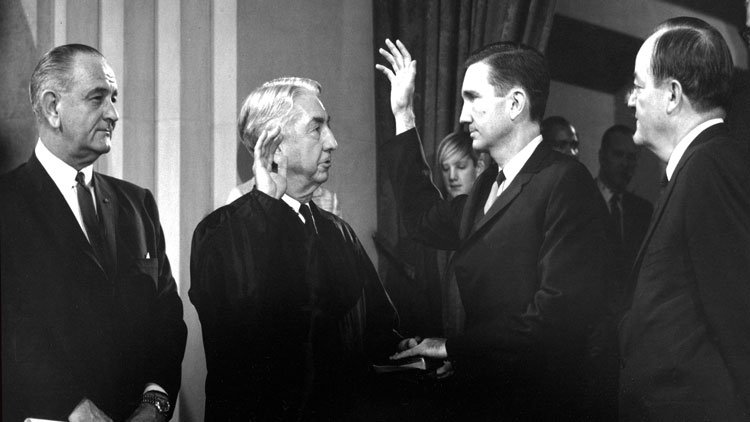
Ramsey Clark (center right) being sworn in as Attorney General by his father, U.S. Supreme Court Justice Tom Clark, as President Lyndon Johnson and Vice President Hubert Humphrey look on.
Before he became a U.S. Attorney General and then an advocate for controversial clients, Ramsey Clark was a lawyer in a Dallas law firm.
Clark, who died April 9 in New York, worked from 1951 to 1961 at Clark, Reed and Clark in Dallas. The firm was founded by his father Tom Clark, who later became a U.S. Supreme Court justice – the only justice in the court’s history who hailed from Texas. Other Clark family members who were lawyers also populated the firm. No memorial service has yet been scheduled.
In the wake of his death at age 93, Ramsey Clark has been remembered as a civil rights champion and “liberal lightning rod” during the administration of Lyndon Johnson. And it was Ramsey Clark whose rise to the position of attorney general in 1967 led Thurgood Marshall to become the first black justice of the Supreme Court. Concerned about conflicts of interest, Tom Clark stepped down from the Supreme Court when his son became attorney general, creating a Supreme Court opening for Johnson to appoint Marshall.
After Ramsey Clark’s tenure as attorney general ended in 1969, he assisted a range of controversial people, from Iraqi president Suddam Hussein to Yugoslavian president Slobodan Molosevic. In 1970, he tried to testify in favor of the Chicago 7, the group charged with conspiracy to incite a riot at the 1968 Democratic National convention in Chicago — even though Clark had been in the Justice Department at the time, and the administration was countering the riot. Actor Michael Keaton plays a cameo role as Ramsey Clark in the current movie “The Trial of the Chicago 7.”
In spite of Ramsey Clark’s unconventional exploits, he and his father remained close, according to Larry Temple, a solo practitioner in Austin who clerked for Justice Clark in 1959 and was a longtime friend of Ramsey Clark as well. Temple, 85, is also chairman of the board of trustees of the LBJ Foundation.
“It was as good a father-son relationship as there could ever be, and I saw it up close,” Temple said in an interview with Texas Lawbook. “Justice Clark disagreed with some of the things Ramsey said, and Ramsey disagreed with some of the things that his father said, or did, or wrote or his own opinions. They never uttered a negative word about each other.”
Temple added, “I would not have gone over to represent Saddam Hussein and some of the other despots that he did, but Ramsey was maybe as pure a human being as I ever knew. There was no guile to him, and he wasn’t posturing, or demagoguing about any of those things he did that were unpopular. He just truly believed in what he was doing. He truly believed that those people were entitled to representation.”
Temple also said Ramsey Clark “was a good lawyer, a really good lawyer in private practice. But I’m not sure that was ever an interest of his. Money was never a factor for Ramsey.”
Ramsey Clark earned his undergraduate degree at the University of Texas, where he met his future wife, Georgia Welch. But he went to the University of Chicago for his law degree. Ramsey had already become well known among Texas politicians, and when the Texas bar results were released, then-senator Ralph Yarborough called Ramsey to tell him that he had passed with the highest score of anyone who had received his law degree from out of state, according to Alexander Wohl, author of a book about the Clarks, father and son.
Clark, Reed and Clark specialized in antirust cases. Ramsey also represented small businesses against large oil companies, though the firm did a large amount of corporate defense work. Ramsey also helped launch the first legal aid society in Dallas.
He even got to argue before the U.S. Supreme Court while he worked for the Dallas law firm – a prize accomplishment that would have been unlikely for an associate except for the fact that his father was a Supreme Court justice. The case, argued in May 1959, was Safeway Stores v. Oklahoma Retail Grocers Association, an antitrust dispute challenging an Oklahoma law that barred merchants from selling products below a certain cost. Justice Clark recused himself.
“With his father sitting on the sidelines, a unanimous court held against Ramsey and Safeway, on both procedural and constitutional grounds,” wrote Wohl, who also wondered why “Ramsey, a relatively junior lawyer, was chosen to argue the case, rather than one of the firm’s more senior attorneys, which included his uncle Robert Clark.” Wohl added, “One possibility was that Ramsey already had his eye on making a move to Washington.”
When John F. Kennedy was elected president in 1960, he “pulled out all the stops to gain an appointment to the new administration,” according to Wohl. “He no longer found the practice of law in Dallas to be satisfying, and he wanted to be ‘part of the action.’”
His efforts were successful. In 1961, at the age of 33, he was nominated by President Kennedy to be assistant attorney general for what was then called the Land Division of the Justice Department, now called the Environment and Natural Resources Division. In 1965, he became deputy attorney general, and in 1967, he became Johnson’s attorney general. His father Justice Clark swore him in to each of his positions.
